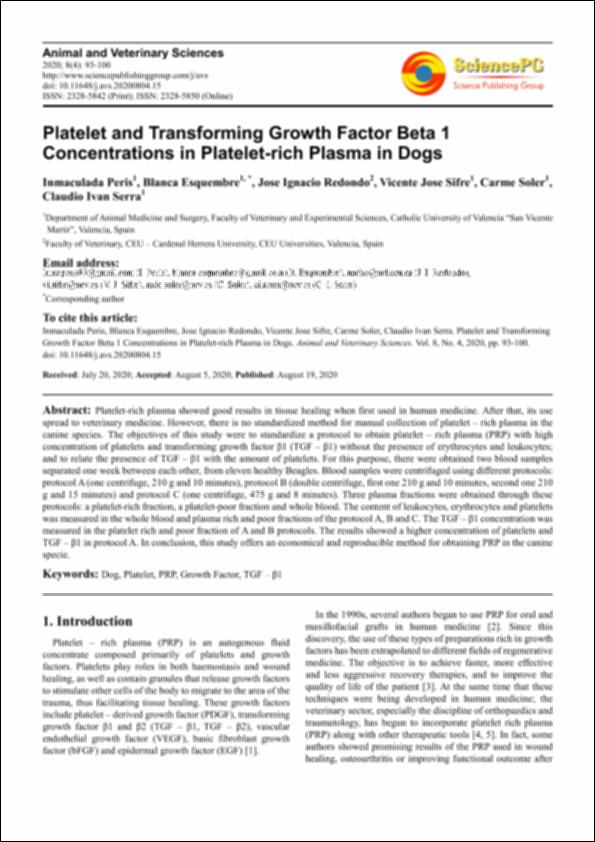Please use this identifier to cite or link to this item:
http://hdl.handle.net/10637/13041Platelet and transforming growth factor Beta 1 concentrations in platelet-rich plasma in dogs
| Title: | Platelet and transforming growth factor Beta 1 concentrations in platelet-rich plasma in dogs |
| Authors : | Peris, Inmaculada Esquembre, Blanca Redondo García, José Ignacio Sifre Canet, Vicente José Soler i Canet, María del Carme Serra Aguado, Claudio Iván |
| Keywords: | Crecimiento - Factores.; Plaquetas.; Blood platelets.; Plasma sanguíneo.; Growth factors.; Perros.; Blood plasma.; Dogs. |
| Publisher: | Science Publishing Group |
| Citation: | Peris, I., Esquembre, B., Redondo, J.I., Sifre, V.J., Soler, C. & Serra, C.I. (2020). Platelet and transforming growth factor Beta 1 concentrations in platelet-rich plasma in dogs. Animal and Veterinary Sciences, vol. 8, n. 4 (01 jul.), pp. 93-100. DOI: https://doi.org/10.11648/j.avs.20200804.15 |
| Abstract: | Platelet-rich plasma showed good results in tissue healing when first used in human medicine. After that, its use spread to veterinary medicine. However, there is no standardized method for manual collection of platelet – rich plasma in the canine species. The objectives of this study were to standardize a protocol to obtain platelet – rich plasma (PRP) with high concentration of platelets and transforming growth factor β1 (TGF – β1) without the presence of erythrocytes and leukocytes; and to relate the presence of TGF – β1 with the amount of platelets. For this purpose, there were obtained two blood samples separated one week between each other, from eleven healthy Beagles. Blood samples were centrifuged using different protocols: protocol A (one centrifuge, 210 g and 10 minutes), protocol B (double centrifuge, first one 210 g and 10 minutes, second one 210 g and 15 minutes) and protocol C (one centrifuge, 475 g and 8 minutes). Three plasma fractions were obtained through these protocols: a platelet-rich fraction, a platelet-poor fraction and whole blood. The content of leukocytes, erythrocytes and platelets was measured in the whole blood and plasma rich and poor fractions of the protocol A, B and C. The TGF – β1 concentration was measured in the platelet rich and poor fraction of A and B protocols. The results showed a higher concentration of platelets and TGF – β1 in protocol A. In conclusion, this study offers an economical and reproducible method for obtaining PRP in the canine specie. |
| Description: | Este artículo se encuentra disponible en la siguiente URL: http://www.sciencepublishinggroup.com/journal/paperinfo?journalid=212&doi=10.11648/j.avs.20200804.15 |
| URI: | http://hdl.handle.net/10637/13041 |
| Rights : | http://creativecommons.org/licenses/by/4.0/deed.es |
| ISSN: | 2328-5842 2328-5850 (Electrónico) |
| Issue Date: | 1-Jul-2020 |
| Center : | Universidad Cardenal Herrera-CEU |
| Appears in Collections: | Dpto. Medicina y Cirugía Animal |
Items in DSpace are protected by copyright, with all rights reserved, unless otherwise indicated.


